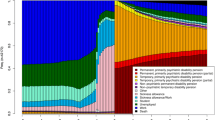Abstract
Background
There is intense political interest in retaining older workers in the workforce, to fund lengthening retirements. While health is important in early exit from work, the health of early retirees has been little studied.
Objective
The aim of this study was to compare the health status of economically active 50- to 64-year-olds with economically inactive former workers (termed early retirees).
Methods
A total of 1,875 respondents to the 2000 Psychiatric Morbidity Survey of Great Britain were included in the analysis. Current common mental (neurotic) disorder presence was based on the revised Clinical Interview Schedule (CIS-R).
Results
Results In all, 71.2% of men and 66.4% of women early retirees reported having a long-standing illness. Of early retired men, 22.2% have a common mental disorder compared to 8.2% of those still in work (p value of difference <0.001). In contrast, the respective figures for women were 18.2% and 16.9%. In fully adjusted regression models for men, early retirees were more likely to have generalised anxiety disorders (OR 3.1: 95% CI: 1.2–7.8) and depressive disorders (OR 4.3: 95% CI: 1.7–11.0).
Conclusion
There is a substantial burden of specific mental health disorders in early retiree men. Understanding the mechanisms of this excess of mental disorders in early retiree men may be a prerequisite to increasing the numbers seeking or staying in work up to age 65.
Similar content being viewed by others
References
Banks J, Blundell R, Disney R, Emmerson C (2002) Retirement, Pensions and the Adequacy of Saving: A guide to the debate (Briefing Note No. 29). Institute for Fiscal Studies, London
Bosse R, Aldwin CM, Levenson MR, Ekerdt DJ (1987) Mental health differences among retirees and workers: findings from the Normative Aging Study. Psychol Aging 2(4):383–389
Brenner H, Ahern W (2000) Sickness absence and early retirement on health grounds in the construction industry in Ireland. Occup Environ Med 57(9):615–620
Claussen B (1999) Health and re-employment in a five-year follow-up of long-term unemployed. Scand J Public Health 27(2):94–100
Drentea P (2002) Retirement and mental health. J Aging Health 14(2):167–194
Fryers T, Melzer D, Jenkins R (2003) Social inequalities and the common mental disorders: a systematic review of the evidence. Soc Psychiatry Psychiatr Epidemiol 38:229–237
Gall TL, Evans DR, Howard J (1997) The retirement adjustment process: changes in the well-being of male retirees across time. J Gerontol B Psychol Sci Soc Sci 52(3):110–117
Gallo WT, Bradley EH, Siegel M, Kasl SV (2000) Health effects of involuntary job loss among older workers: findings from the health and retirement survey. J Gerontol B Psychol Sci Soc Sci 55(3):S131–S140
Ginn J, Arber S (1995) Exploring midlife women’s employment. Sociology—the Journal of the British Sociological Association 29(1):73–94
Kasl SV (1980) The impact of retirement. In: Cooper CL, Payne R (eds) Current Concerns in Occupational Stress. John Wiley and Sons, Chichester
Kasl SV, Jones BA (2000) The impact of job loss and retirement on health. In: Berkman LF, Kawachi I (eds) Social Epidemiology. Oxford University Press, Oxford
Kim JE, Moen P (2002) Retirement transitions, gender, and psychological well-being: a life-course, ecological model. J Gerontol B Psychol Sci Soc Sci 57(3):212–222
Lewis G, Pelosi AJ, Araya R, Dunn G (1992) Measuring psychiatric disorder in the community: a standardized assessment for use by lay interviewers. Psychol Med 22(2):465–486
McGoldrick A (1989) Stress, early retirement and health. In: Markides K, Cooper C (eds) Aging, Stress, and Health. John Wiley and Sons, Chichester
McGoldrick A, Cooper C (1989) Early Retirement. Gower, Aldershot
Mein G, Martikainen P, Hemingway H, Stansfeld S, Marmot M (2003) Is retirement good or bad for mental and physical health functioning? Whitehall II longitudinal study of civil servants. J Epidemiol Community Health 57(1):46–49
Mein G, Martikainen P, Stansfeld SA, Brunner EJ, Fuhrer R, Marmot MG (2000) Predictors of early retirement in British civil servants. Age Ageing 29(6):529–536
Melzer D, Buxton J (2004) Decline in common mental disorder prevalence in men during the sixth decade of life: evidence from the National Psychiatric Morbidity Survey. Soc Psychiatry Psychiatr Epidemiol 39(1):33–38
Midanik LT, Soghikian K, Ransom LJ, Tekawa IS (1995) The effect of retirement on mental health and health behaviors: the Kaiser Permanent Retirement Study. J Gerontol B Psychol Sci Soc Sci 50(1):S59–S61
Palmore EB, Fillenbaum GG, George LK (1984) Consequences of retirement. J Gerontol 39(1):109–116
Pattani S, Constantinovici N, Williams S (2001) Who retires early from the NHS because of ill health and what does it cost? A national cross sectional study. BMJ 322(7280):208–209
Poole CJ (1997) Retirement on grounds of ill health: cross sectional survey in six organisations in United Kingdom. BMJ 314(7085):929–932
Rodgers LM (1998) A five year study comparing early retirements on medical grounds in ambulance personnel with those in other groups of health service staff—Part II: causes of retirements. Occupational Medicine-Oxford 48(2):119–132
Ross CE, Drentea P (1998) Consequences of retirement activities for distress and the sense of personal control. J Health Soc Behav 39(4):317–334
Salokangas RK, Joukamaa M (1991) Physical and mental health changes in retirement age. Psychother Psychosom 55(2–4):100–107
Singleton N, Bumpstead R, O’Brien M, Lee A, Meltzer H (2001) Psychiatric Morbidity among Adults living in Private Households, 2000, The Stationery Office, London
Stansfeld S (2002) Work, personality and mental health. Br J Psychiatry 181:96–98
Stata Corp (1999) Stata Statistical Software: Release 7.0. Stata Corporation, College Station, TX
Warr P, Jackson P, Banks M (1988) Unemployment and mental health: some British studies. J Soc Issues 44(4):47–68
Warr P, Jackson P (1985) Factors influencing the psychological impact of prolonged unemployment and of re-employment. Psychol Med 15(4):795–807
WHO (1993) The ICD-10 Classification of Mental and Behavioural Disorders: Diagnostic Criteria for Research. WHO, Geneva
Author information
Authors and Affiliations
Corresponding author
Rights and permissions
About this article
Cite this article
Buxton, J.W., Singleton, N. & Melzer, D. The mental health of early retirees. Soc Psychiatry Psychiatr Epidemiol 40, 99–105 (2005). https://doi.org/10.1007/s00127-005-0866-5
Accepted:
Issue Date:
DOI: https://doi.org/10.1007/s00127-005-0866-5



